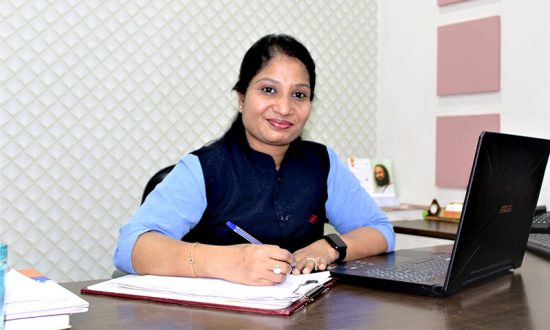Dr Swati Vijay is a Speech Therapist, Audiology Specialist, and gold medalist in (College and year). She played a pivotal role in helping people with voice problems, stuttering, speech pathology, and now provides consultation to hospitals seeking this certification. Her tremendous 15 years of experience in her field transformed many lives. In addition to treating a cohort of speech-related problems, Dr Swati is an expert in human psychology. Her love for kids and a better understanding of child and teenage psychology led her to step into the education sector.
The year of 2020 has been an awkward and exhilarating phase for the young developing minds, the goals, ambitions and the roots of learning changed drastically. Being a teenager in these times, came with its own share of baggage, the baggage gets even heavier being a parent to this teenager. Parents were struggling to create a balance between controlling, managing and nurturing their adolescents. Academics in any possible manner could not go for a toss and needed to be streamlined as per the requirements of the hybrid learning model.
Living with teenagers comes at its own cost, the shaping of opinions is fast and rigid. It requires more than the ability to simply listen and understand, for getting through their minds. Additionally, when a deadly virus is lurking outside, the ecosystem around the teenagers should be conducive to inspiring growth and motivation to witness the positivity in adversity.
- Altruism is an important virtue
A true act of goodwill always sparks another. Imbibing the young ones with the virtue of altruism is a healthy step for the mental and social growth of an individual. The pandemic situation where students were battling for basic resources and opportunities, the adolescents undergoing this phase were prone to stress and anxiety. In such times, letting the kindness prevail among not just the peer group but towards teachers as well would be a prudent step. This would also make teenagers more careful about the people around them, and further serve as becoming awareness agents for society.
- Readiness to adapt
Teenagers are undergoing a lot of changes, physically and mentally which is just the opposite of what the current times and hybrid model of learning demands them to do. It is important parents understand that fear and controlling behaviour cannot be established as long-term practices especially for the maturing individuals into adulthood. As innately, they are also seeking to gain some power and control with maturity. Training them to adapt is only possible when you expose them to situations out of their comfort zone but do not become too pushy. Teenagers can get either get creative and evolve, or be repulsive at the very instinct. So lending an ear to their interests, plans and perception will be the right step to work with them.
- Social learning courses
Social interactions have been constrained and reformed to the virtual meetings. Classrooms are no more about entering the class late, cracking jokes with your classmates about the excuses made, and so on. Hybrid learning model tries and introduces the human element via multiple fun activities and games, but in the end, the monotony of consecutive classes cannot just be overcome with breaks. Social learning courses are the right choice for adolescents. Online instructor-led fitness and skill-based programs aimed at striking the right balance between the physical and mental well-being of children have caught the attention of many parents. A significant percentage of parents were comfortable in letting their child participate in home-based sports events. As with the aid of such programs, they could ensure that kids can continue to stay active and nurture their sports journey in the comfort of their own homes, thus making screen time more productive for them.
- Help kids function towards their passion
Adolescents in their reforming years tend to grasp concepts faster, and habits cultivated during this time tend to last longer. Engaging them towards something that they genuinely love and feel relax in doing it, not just add on to their skill set, but also pushes them towards working hard for their academics.
- Make time for health and wellness
World Health Organization also formulated new guidelines for young children to strike a balance of physical activity, non-screen sedentary time and adequate sleep. This highlights the ardent need for a fitness routine in every teenager’s daily lifestyle. The kind of diet, sleeping schedule, stress levels also play an important role in influencing the health of an individual. Physical activities like Yoga and exercise also give chance to more family time and acts as a good relief break from the screen time.




